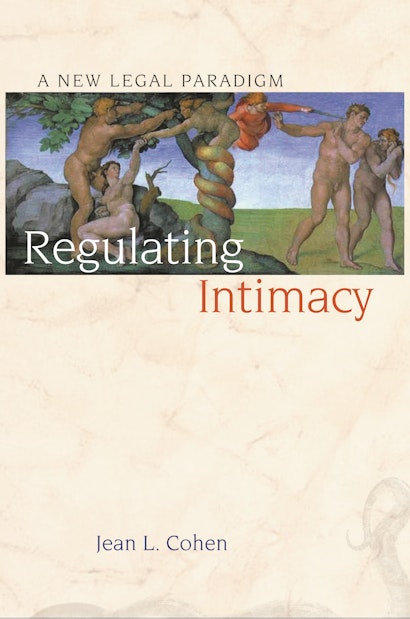The regulation of intimate relationships has been a key battleground in the culture wars of the past three decades. In this bold and innovative book, Jean Cohen presents a new approach to regulating intimacy that promises to defuse the tensions that have long sparked conflict among legislators, jurists, activists, and scholars.
Disputes have typically arisen over questions that apparently set the demands of personal autonomy, justice, and responsibility against each other. Can law stay out of the bedroom without shielding oppression and abuse? Can we protect the pursuit of personal happiness while requiring people to behave responsibly toward others? Can regulation acknowledge a variety of intimate relationships without privileging any? Must regulating intimacy involve a clash between privacy and equality? Cohen argues that these questions have been impossible to resolve because most legislators, activists, and scholars have drawn on an anachronistic conception of privacy, one founded on the idea that privacy involves secrecy and entails a sphere free from legal regulation. In response, Cohen draws on Habermas and other European thinkers to present a robust “constructivist” defense of privacy, one based on the idea that norms and rights are legally constructed.
Cohen roots her arguments in debates over three particularly contentious issues: reproductive rights, sexual orientation, and sexual harassment. She shows how a new legal framework, “reflexive law,” allows us to build on constructivist insights to approach these debates free from the liberal and welfarist paradigms that usually structure our legal thought. This new legal paradigm finally allows us to dissolve the tensions among autonomy, equality, and community that have beset us. A synthesis of feminist theory, political theory, constitutional jurisprudence, and cutting-edge research in the sociology of law, this powerful work will reshape not only legal and political debates, but how we think about the intimate relationships at the core of our own lives. .
Jean L. Cohenis Professor of Political Science at Columbia University. She is a specialist in contemporary political and legal theory with special interests in democratic theory, critical theory, civil society, sovereignty, gender, and law. She is author of Class and Civil Society: The Limits of Marxian Critical Theory and coauthor of Civil Society and Political Theory.
"Cohen challenges each reader to defend his or her own normative account of liberty and equality. . . . By proposing a role for reflexive law outside the realm of technocracy, Cohen offers the possibility that our collective efforts to solve our practical problems can aid in articulating the rights that define the kinds of persons we are."—Michael C. Dorf, Columbia Law Review
"Although Jean L. Cohen focuses on sexual relations, reproductive rights, and sexual discrimination, her reflexive paradigm of law applies to any sort of legal regulations. . . . [F]or those scholars interested in a theoretically grounded approach to understanding the Court's decision in Lawrence v. Texas, as well as any type of legal regulation . . . Cohen's book is worth the effort."—Daniel Mangis, Rhetoric and Public Affairs
"Cohen's work brings new substance and new clarity to claims for the proceduralization (or reflexivity) of law. Cohen denies the independence of political-moral orientations from idealizations of the legal form and the background models of individual, society, and state that motivate such idealizations. She shows convincingly how the legal-formal idealizations native to a debate between classical and welfare liberalism inevitably mistranslate and miscarry the distinctive aims of a constructivist, deontological liberalism that differs crucially from them both."—Frank Michelman, Harvard University
"I have read Regulating Intimacy with much pleasure and profit. Professor Cohen illuminates the conceptual and policy issues that arise when we try to encourage intimate associations that are both free and responsible. This is a welcome contribution to the integration of moral and social theory. It deals extensively with contemporary legal doctrine, and helps us make sense of new thinking about law and society."—Philip Selznick, author of The Communitarian Persuasion
"Cohen has written an enormously impressive contribution to legal and political scholarship sure to be of interest to a broad audience of scholars, policy makers, and activists. Creatively borrowing from recent debates within European legal theory about the prospects of a 'reflexive paradigm' of regulation, she demonstrates persuasively why traditional views of the proper legal treatment of the domain of intimacy need to be reformulated. Those interested in a host of ongoing legal debates about privacy and sexuality will find answers to many of their questions here. Cohen has authored a genuinely pathbreaking work which should influence policy and judicial decisionmaking."—William E. Scheuerman, University of Minnesota
"This is a bold, exciting, novel defense of privacy law. Cohen's learned approach to arguing that privacy is neither arbitrary nor archaic engages a surprisingly wide range of important contemporary thinkers. Her selection of case studies is timely and of great interest—giving the book immediate practical value. It will attract many readers and critics."—Anita Allen, University of Pennsylvania

